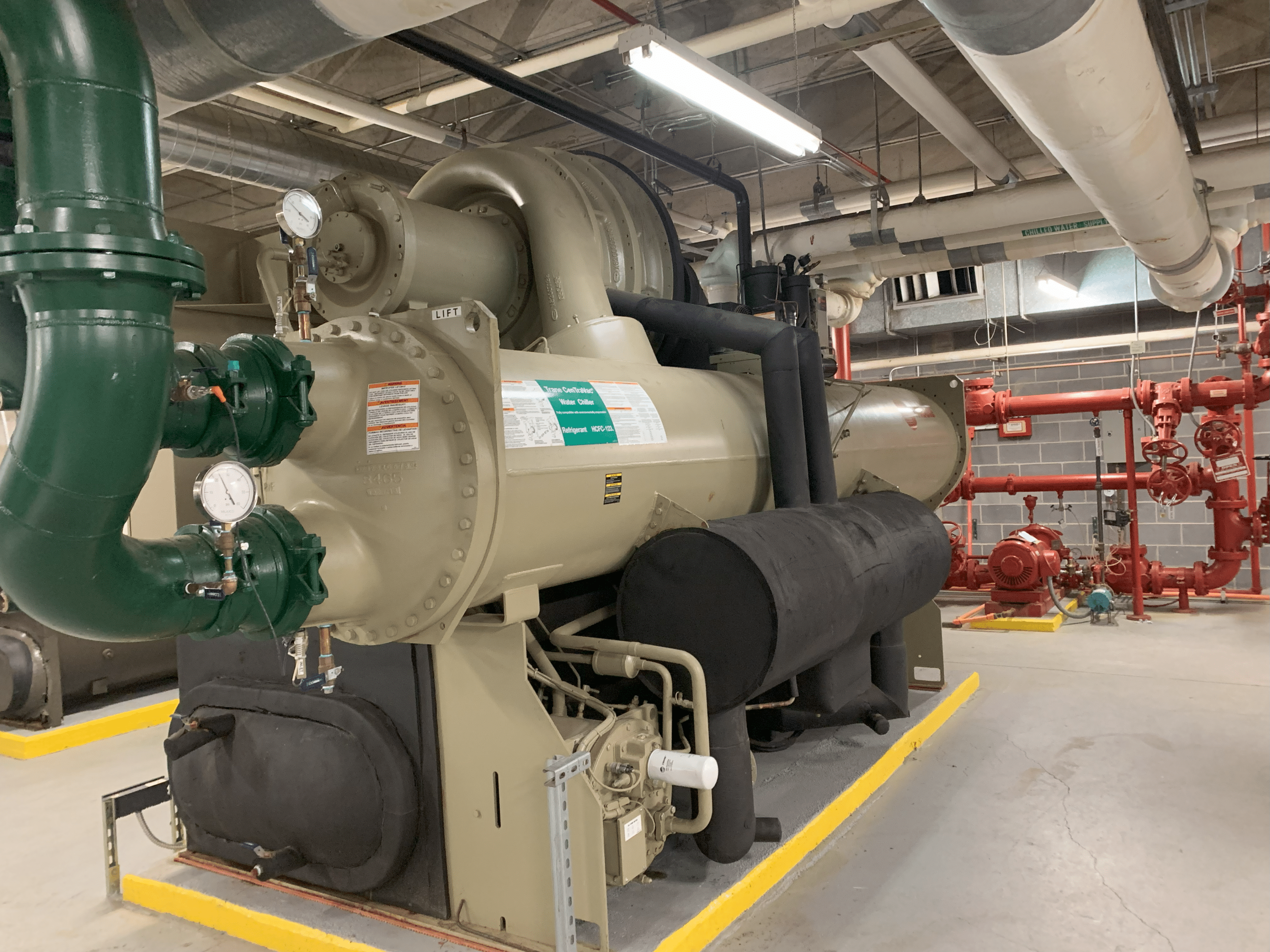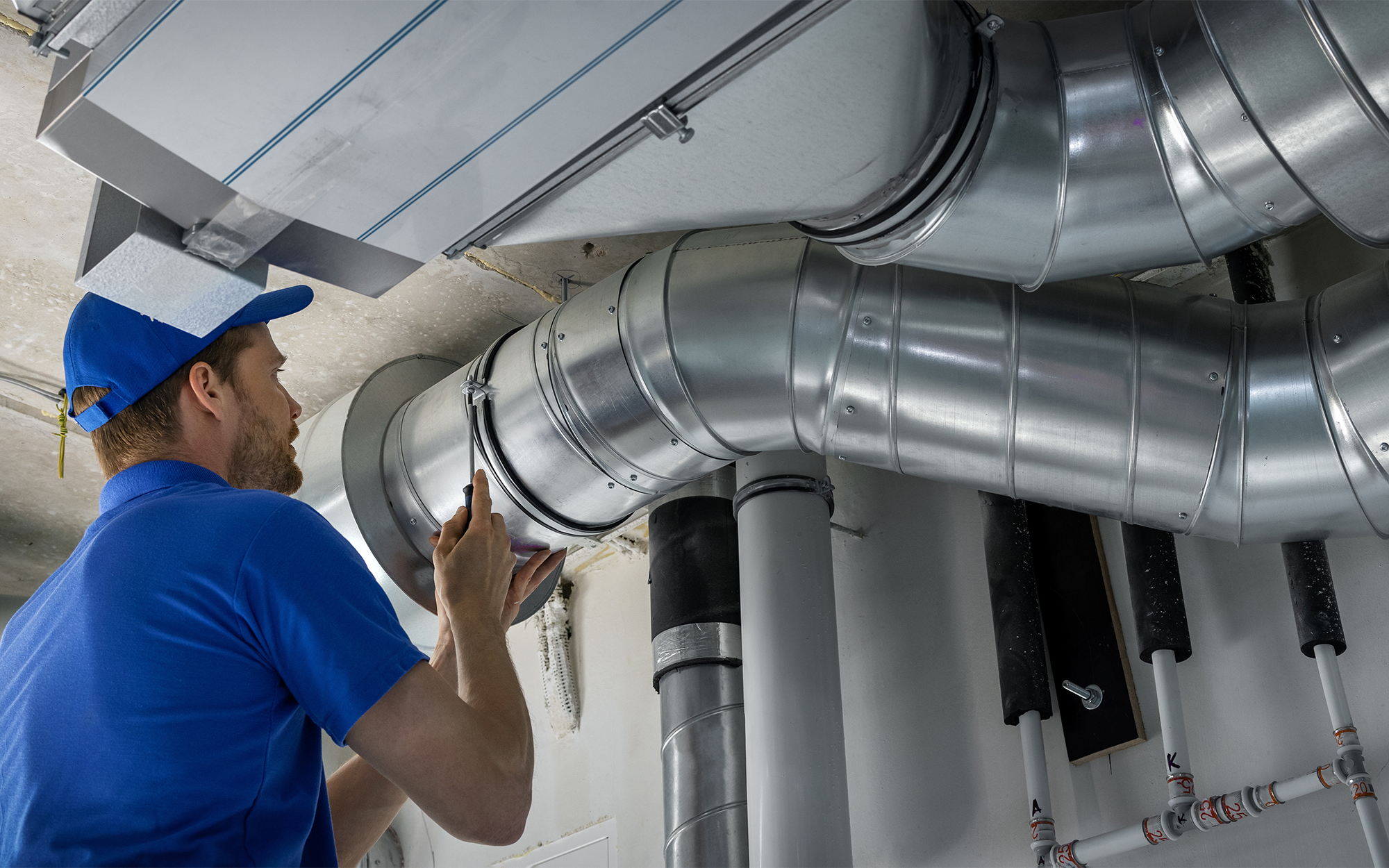Learn why HVAC experts are vital for sustained system performance
Discovering the Vital Elements of a Reliable A/c System
An efficient heating and cooling system is improved numerous essential elements that work in harmony. Each component, from the thermostat to the ductwork, plays an essential duty in maintaining comfort and energy effectiveness. Understanding these aspects is crucial for optimizing performance and enhancing interior air quality. As one takes a look at these parts, the detailed partnerships between them reveal understandings right into enhancing general system performance. What specific factors contribute most to this efficiency?
The Function of the Thermostat in Cooling And Heating Performance

Although commonly overlooked, the thermostat plays a critical duty in the efficiency of heating and cooling systems. HVAC experts. This small tool serves as the key nerve center, managing temperature settings and guaranteeing optimal comfort within a space. By accurately picking up the ambient temperature, the thermostat communicates with the ventilation, heating, and air conditioning devices to keep the desired climate
An efficient thermostat reduces energy consumption by activating the heating and cooling system just when essential, thereby stopping too much home heating or air conditioning. Modern programmable and smart thermostats improve this performance further by allowing customers to establish timetables and remotely adjust setups, adapting to day-to-day regimens.
In addition, the positioning of the thermostat is crucial; improper area can lead to unreliable temperature level analyses, leading to ineffective operation. In general, a well-functioning thermostat not just enhances convenience yet likewise adds noticeably to power financial savings and the durability of the cooling and heating system.
Recognizing the Importance of Air Filters
Air filters offer an essential function in heating and cooling systems by guaranteeing that the air distributing within an area stays healthy and clean. These filters trap dust, irritants, and other pollutants, preventing them from being recirculated throughout the setting. By recording these bits, air filters add to improved indoor air high quality, which can significantly benefit passengers' health and wellness, especially those with allergic reactions or respiratory conditions.
In addition, keeping clean air filters improves the effectiveness of heating and cooling systems. Blocked filters can restrict airflow, creating the system to work more difficult to preserve desired temperature levels, bring about raised energy consumption and higher utility bills. Routinely replacing or cleaning up filters is an essential maintenance step that can prolong the lifespan of HVAC tools. Eventually, recognizing the importance of air filters allows property owners and building supervisors to take aggressive steps to guarantee a well-functioning, efficient cooling and heating system that advertises a safe and comfy indoor setting.

The Functionality of the Heating System and Heat Pump
Furnaces and warmth pumps are essential components of HVAC systems, accountable for providing warmth during cooler months. Heaters run by heating air via burning or electric resistance, after that distributing it throughout the home by means of ducts. They generally provide quick heating and can be fueled by gas, electricity, or oil, relying on the system type.
Alternatively, heatpump transfer warm instead of create it. They extract warmth from the outdoors air or ground, also in low temperatures, and move it inside. HVAC experts. This double capability allows heatpump to additionally give air conditioning in warmer months, making them versatile alternatives for year-round climate control
Both systems call for correct maintenance to assure performance and long life. While heating systems excel in extreme cold, warm pumps can be beneficial in modest environments. Recognizing their distinctive functionalities help homeowners in picking one of the most appropriate alternative for their home heating needs.
Discovering the A/c System
The cooling system is a vital element of heating and cooling systems, available in numerous kinds to suit various needs. Comprehending the effectiveness rankings of these devices is vital for making notified selections about energy usage and price. This section will certainly discover the diverse kinds of a/c unit and clear up exactly how performance rankings effect efficiency.
Sorts Of Air Conditioners
While different aspects influence the choice of a/c systems, comprehending the different kinds offered is crucial for home owners and structure supervisors alike. Central air conditioners are made to cool entire homes or structures, using a network of ducts for airflow. Window units use an even more localized remedy, ideal for solitary areas or small spaces. Portable a/c give adaptability, enabling individuals to move the unit as needed. Ductless mini-split systems are an additional alternative, combining the efficiency of central systems with the benefit of zoning, as they call for no ductwork. Lastly, geothermal systems harness the earth's temperature for energy-efficient air conditioning. Each kind includes unique advantages, making notified selections important for efficient environment control.
:strip_icc()/GettyImages-1512099092-87093749945241799ea83d87154b40ef.jpg)
Performance Rankings Clarified
Understanding effectiveness ratings is crucial for selecting the appropriate cooling system, as these metrics provide insight right into the system's efficiency and energy intake. One of the most common rating for a/c unit is the Seasonal Power Effectiveness Proportion (SEER), which measures the cooling output during a normal cooling season divided by the total electric power input. A higher SEER shows far better performance. In addition, the Energy Effectiveness Ratio (EER) is utilized for determining performance under certain problems. One more important metric is the Energy Celebrity certification, which represents that a device satisfies strict energy efficiency standards. By assessing these ratings, consumers can make educated options that not only maximize comfort however additionally decrease power prices and environmental impact.
The Importance of Ductwork and Airflow
Efficient ductwork design and air flow management play essential duties in the total performance and performance of cooling and heating systems. Appropriate ductwork guarantees that conditioned air is distributed evenly throughout an area, lessening temperature level changes and boosting convenience. Well-designed air ducts lessen resistance to air movement, minimizing the work on a/c devices and inevitably decreasing energy usage.
Air flow monitoring entails tactically putting vents and signs up to boost the circulation of air. This protects against usual issues such as warm or cold areas, which can occur when air movement is obstructed or improperly balanced. Furthermore, the appropriate duct materials and insulation can better boost performance by reducing warm loss or gain during air transportation.
An efficient ductwork Check Out Your URL system not only contributes to energy savings however can likewise prolong the life-span of HVAC devices by lowering unnecessary strain (HVAC experts). Consequently, comprehending the importance of ductwork and airflow is crucial for accomplishing peak heating and cooling system efficiency
Routine Upkeep Practices to Improve Performance
Normal upkeep practices are important for making certain peak performance of HVAC systems. These practices consist of regular evaluations, cleaning, and required repairs to maintain the system running efficiently. On a regular basis transforming air filters is important, as clogged up filters can block air flow and reduce effectiveness. In addition, service technicians ought to check and tidy evaporator and condenser coils to avoid getting too hot and energy wastefulness.
Yearly expert examinations are additionally recommended, as experienced service technicians can determine prospective concerns before they intensify. Lubing relocating parts minimizes wear and tear, adding to a much longer life expectancy for the system. Furthermore, making certain that the thermostat operates correctly help in keeping suitable temperature control.

Often Asked Concerns
Exactly how Typically Should I Change My Thermostat?
Thermostats should typically be replaced every 5 to one decade, depending upon usage and technology improvements. Regular checks are recommended to guarantee peak performance, particularly if experiencing inconsistent temperature control or enhanced additional resources power costs.
What Size Air Filter Is Finest for My Cooling And Heating System?
The best size air filter for an a/c system varies by device style. Normally, it's vital to speak with the proprietor's guidebook or check the existing filter dimensions to ensure peak performance and air quality.
Can I Mount a Heatpump Myself?
Installing a warm pump separately is possible for skilled people, however it requires try these out expertise of electrical systems and regional codes. Employing a specialist is suggested to guarantee proper installation and suitable system performance.
Exactly how Do I Know if My Ductwork Is Efficient?
To identify ductwork effectiveness, one need to inspect for leaks, action airflow at vents, evaluate insulation top quality, and evaluate temperature level distinctions between supply and return ducts. Expert evaluations can offer complete insights right into total efficiency.
What Are Signs My A/c Demands Immediate Upkeep?
Signs that an a/c system needs prompt maintenance include uncommon noises, irregular temperature levels, increased energy bills, undesirable odors, and frequent biking. Addressing these issues without delay can avoid further damages and guarantee optimal system efficiency.
Air filters offer an important feature in HVAC systems by ensuring that the air distributing within a room continues to be healthy and balanced and tidy. Additionally, keeping clean air filters improves the effectiveness of Heating and cooling systems. Ductless mini-split systems are an additional alternative, integrating the performance of main systems with the comfort of zoning, as they need no ductwork. Comprehending effectiveness ratings is vital for choosing the best air conditioning system, as these metrics supply understanding into the system's efficiency and energy usage. The finest dimension air filter for a Heating and cooling system varies by device layout.